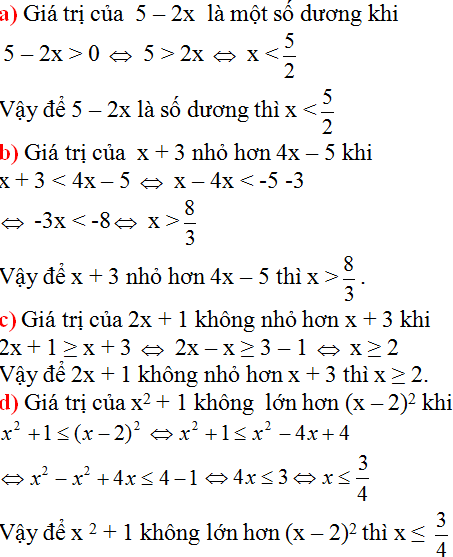Hãy nhập câu hỏi của bạn vào đây, nếu là tài khoản VIP, bạn sẽ được ưu tiên trả lời.

a) Để giá trị biểu thức 5 – 2x là số dương
<=> 5 – 2x > 0
<=> -2x > -5 ( Chuyển vế và đổi dấu hạng tử 5 )
\(\Leftrightarrow x< \frac{5}{2}\)( Chia cả 2 vế cho -2 < 0 ; BPT đổi chiều )
Vậy : \(x< \frac{5}{2}\)
b) Để giá trị của biểu thức x + 3 nhỏ hơn giá trị biểu thức 4x - 5 thì:
x + 3 < 4x – 5
<=< x – 4x < -3 – 5 ( chuyển vế và đổi dấu các hạng tử 4x và 3 )
<=> -3x < -8
\(\Leftrightarrow x>\frac{8}{3}\)( Chia cả hai vế cho -3 < 0, BPT đổi chiều).
Vậy : \(x>\frac{8}{3}\)
c) Để giá trị của biểu thức 2x +1 không nhỏ hơn giá trị của biểu thức x + 3 thì:
2x + 1 ≥ x + 3
<=> 2x – x ≥ 3 – 1 (chuyển vế và đổi dấu các hạng tử 1 và x).
<=> x ≥ 2.
Vậy x ≥ 2.
d) Để giá trị của biểu thức x2 + 1 không lớn hơn giá trị của biểu thức (x - 2)2 thì:
x2 + 1 ≤ (x – 2)2
<=> x2 + 1 ≤ x2 – 4x + 4
<=> x2 – x2 + 4x ≤ 4 – 1 ( chuyển vế và đổi dấu hạng tử 1; x2 và – 4x).
<=> 4x ≤ 3
\(\Leftrightarrow x\le\frac{3}{4}\)( Chia cả 2 vế cho 4 > 0 )
Vậy : \(x\le\frac{3}{4}\)

Answer:
a) \(\frac{5x}{2x+2}+1=\frac{6}{x+1}\)
\(\Rightarrow\frac{5x}{2\left(x+1\right)}+\frac{2\left(x+1\right)}{2\left(x+1\right)}=\frac{12}{2\left(x+1\right)}\)
\(\Rightarrow5x+2x+2-12=0\)
\(\Rightarrow7x-10=0\)
\(\Rightarrow x=\frac{10}{7}\)
b) \(\frac{x^2-6}{x}=x+\frac{3}{2}\left(ĐK:x\ne0\right)\)
\(\Rightarrow x^2-6=x^2+\frac{3}{2}x\)
\(\Rightarrow\frac{3}{2}x=-6\)
\(\Rightarrow x=-4\)
c) \(\frac{3x-2}{4}\ge\frac{3x+3}{6}\)
\(\Rightarrow\frac{3\left(3x-2\right)-2\left(3x+3\right)}{12}\ge0\)
\(\Rightarrow9x-6-6x-6\ge0\)
\(\Rightarrow3x-12\ge0\)
\(\Rightarrow x\ge4\)
d) \(\left(x+1\right)^2< \left(x-1\right)^2\)
\(\Rightarrow x^2+2x+1< x^2-2x+1\)
\(\Rightarrow4x< 0\)
\(\Rightarrow x< 0\)
e) \(\frac{2x-3}{35}+\frac{x\left(x-2\right)}{7}\le\frac{x^2}{7}-\frac{2x-3}{5}\)
\(\Rightarrow\frac{2x-3+5\left(x^2-2x\right)}{35}\le\frac{5x^2-7\left(2x-3\right)}{35}\)
\(\Rightarrow2x-3+5x^2-10x\le5x^2-14x+21\)
\(\Rightarrow6x\le24\)
\(\Rightarrow x\le4\)
f) \(\frac{3x-2}{4}\le\frac{3x+3}{6}\)
\(\Rightarrow\frac{3\left(3x-2\right)-2\left(3x+3\right)}{12}\le0\)
\(\Rightarrow9x-6-6x-6\le0\)
\(\Rightarrow3x\le12\)
\(\Rightarrow x\le4\)

a, Vì \(2+\frac{3-2x}{5}\)không nhỏ hơn \(\frac{x+3}{4}-x\)
\(\Rightarrow2+\frac{3-2x}{5}\ge\frac{x+3}{4}-x\)
Giải phương trình :
\(2+\frac{3-2x}{5}\ge\frac{x+3}{4}-x\)
\(\Rightarrow\frac{40}{20}+\frac{4\left(3-2x\right)}{20}\ge\frac{5\left(x-3\right)}{20}-\frac{20x}{20}\)
\(\Rightarrow40+12-8x\ge5x-15-20x\)
\(\Rightarrow7x=67\)
\(\Rightarrow x\ge\frac{67}{7}\)
b, \(\frac{2x+1}{6}-\frac{x-2}{9}>-3\)
\(\Rightarrow\frac{3\left(2x+1\right)}{18}-\frac{2\left(x-2\right)}{18}>\frac{-54}{18}\)
\(\Rightarrow6x+3-2x+4>-54\)
\(\Rightarrow4x>-61\)
\(\Rightarrow x>\frac{-61}{4}\)\(\left(1\right)\)
Và : \(x-\frac{x-3}{4}\ge3-\frac{x-3}{12}\)
\(\frac{12x}{12}-\frac{3\left(x-3\right)}{12}\ge\frac{36}{12}-\frac{x-3}{12}\)
\(\Rightarrow12x-3x+9\ge36-x+3\)
\(\Rightarrow10x\ge30\)
\(\Rightarrow x\ge3\)\(\left(2\right)\)
Từ \(\left(1\right)\)và \(\left(2\right)\)\(\Rightarrow\hept{\begin{cases}x>\frac{-61}{4}\\x\ge3\end{cases}\Rightarrow x>3}\)
Vậy với giá trị x > 3 thì x là nghiệm chung của cả 2 bất phương trình

\(\left[\frac{x+1}{2x-2}+\frac{3}{x^2-1}-\frac{x+3}{2x+2}\right].\frac{4x^2-4}{5}\) \(ĐKXĐ:x\ne\pm1;\)
\(=\)\(\left[\frac{x+1}{2\left(x-1\right)}+\frac{3}{\left(x-1\right)\left(x+1\right)}-\frac{x+3}{2\left(x+1\right)}\right].\frac{4\left(x^2-1\right)}{5}\)
\(=\left[\frac{\left(x+1\right)^2}{2\left(x-1\right)\left(x+1\right)}+\frac{6}{2\left(x-1\right)\left(x+1\right)}-\frac{\left(x+3\right)\left(x-1\right)}{2\left(x+1\right)\left(x-1\right)}\right]\)\(.\frac{4\left(x-1\right)\left(x+1\right)}{5}\)
\(=\left[\frac{x^2+2x+1+6-\left(x^2+2x-3\right)}{2\left(x-1\right)\left(x+1\right)}\right].\frac{4\left(x-1\right)\left(x+1\right)}{5}\)
\(=\frac{10}{2\left(x-1\right)\left(x+1\right)}.\frac{4\left(x-1\right)\left(x+1\right)}{5}\)
\(=4\)

Dài quá trôi hết đề khỏi màn hình: nhìn thấy câu nào giải cấu ấy
Bài 4:
\(A=\frac{\left(x-1\right)+\left(x+1\right)}{\left(x+1\right)\left(x-1\right)}-\frac{2}{\left(x+1\right)\left(x-1\right)}=\frac{2\left(x-1\right)}{\left(x-1\right)\left(x+1\right)}\)
a) DK x khác +-1
b) \(dk\left(a\right)\Rightarrow A=\frac{2}{\left(x+1\right)}\)
c) x+1 phải thuộc Ước của 2=> x=(-3,-2,0))
1. a) Biểu thức a có nghĩa \(\Leftrightarrow\hept{\begin{cases}x+2\ne0\\x^2-4\ne0\end{cases}}\)
\(\Leftrightarrow\hept{\begin{cases}x+2\ne0\\x-2\ne0\\x+2\ne0\end{cases}}\)
\(\Leftrightarrow\hept{\begin{cases}x\ne-2\\x\ne2\end{cases}}\)
Vậy vs \(x\ne2,x\ne-2\) thì bt a có nghĩa
b) \(A=\frac{x}{x+2}+\frac{4-2x}{\left(x-2\right)\left(x+2\right)}\)
\(=\frac{x\left(x-2\right)}{\left(x+2\right)\left(x-2\right)}+\frac{4-2x}{\left(x+2\right)\left(x-2\right)}\)
\(=\frac{x^2-2x+4-2x}{\left(x+2\right)\left(x-2\right)}\)
\(=\frac{x^2-4x+4}{\left(x+2\right)\left(x-2\right)}\)
\(=\frac{\left(x-2\right)^2}{\left(x+2\right)\left(x-2\right)}\)
\(=\frac{x-2}{x+2}\)
c) \(A=0\Leftrightarrow\frac{x-2}{x+2}=0\)
\(\Leftrightarrow x-2=\left(x+2\right).0\)
\(\Leftrightarrow x-2=0\)
\(\Leftrightarrow x=2\)(ko thỏa mãn điều kiện )
=> ko có gía trị nào của x để A=0

\(\frac{x^2+2x}{2x+10}+\frac{x-5}{x}+\frac{50-5x}{2x\left(x+5\right)}=\frac{x^2+2x}{2\left(x+5\right)}+\frac{x-5}{x}+\frac{50-5x}{2x\left(x+5\right)}=\)
\(=\frac{x\left(x^2+2x\right)+2\left(x+5\right)\left(x-5\right)+50-5x}{2x\left(x+5\right)}=\frac{x^3+2x^2+2x^2-50+50-5x}{2x\left(x+5\right)}=\frac{x^3+4x^2-5x}{2x\left(x+5\right)}=\)
\(=\frac{x\left(x^2+4x-5\right)}{2x\left(x+5\right)}=\frac{x\left(x^2+4x-5\right)}{2x\left(x+5\right)}=\frac{x\left(x^2-1+4\left(x-1\right)\right)}{2x\left(x+5\right)}=\frac{x\left(x-1\right)\left(x+5\right)}{2x\left(x+5\right)}\)
a/ Để biểu thức xác đinh => 2x(x+5) khác 0 => x khác 0 và x khác -5
b/ Gọi biểu thức là A. Rút gọn A ta được:
\(A=\frac{x\left(x-1\right)\left(x+5\right)}{2x\left(x+5\right)}=\frac{x-1}{2}\left(x\ne0;x\ne-5\right)\)
A=1 => x-1=2 => x=3
c/ A=-1/2 <=> x-1=-1 => x=0
d/ A=-3 <=> x-1=-6 => x=-5

Bài 1:
a) Vì giá trị của biểu thức \(\frac{3x-2}{4}\) không nhỏ hơn giá trị của biểu thức \(\frac{3x+3}{6}\) nên \(\frac{3x-2}{4}\) \(\ge\) \(\frac{3x+3}{6}\)
TH1: \(\frac{3x-2}{4}\) = \(\frac{3x+3}{6}\)
=> (3x-2)6 = (3x+3)4
18x -12= 12x+12
=> x = 4
TH2: \(\frac{3x-2}{4}\) > \(\frac{3x+3}{6}\)
=> (3x-2)6 > (3x+3)4
18x-12> 12x+12
=> x \(\ge\) 5
b) Vì ( x+1)2 \(\ge\) 0; (x-1)2 \(\ge\) 0 mà (x+1) luôn lớn hơn (x-1) với mọi x nên không có giá trị của x thỏa mãn (x+1)2 nhỏ hơn (x-1)2
c) Phần c bạn cũng xét tương tự như phần a
TH1: \(\frac{2x-3}{35}+\frac{x\left(x-2\right)}{7}=\frac{x^2}{7}-\frac{2x-3}{5}\)
TH2: \(\frac{2x-3}{35}+\frac{x\left(x-2\right)}{7}<\frac{x^2}{7}-\frac{2x-3}{5}\)
Đã xem -_-